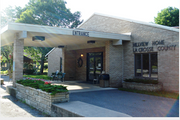What Is Sundown Syndrome & How Is It Managed?

Does your loved one with Alzheimer’s or dementia become more agitated or moody as night falls? Of the 5 million Americans with memory issues, up to 20% will develop a syndrome called Sundowner’s, which is characterized by increased agitation or confusion at night. Learn to identify and manage Sundown Syndrome with the guide below.
What Is Sundown Syndrome?
Common Symptoms
Sundown Syndrome can cause normally calm and sociable individuals to become angry, agitated, or fearful. Other symptoms may include talking to those who aren’t there, suspicion, disorientation, pacing or restlessness, and confusion. Memory loss could worsen.
Triggers of Sundown Syndrome
Every person with Sundown Syndrome will react uniquely; the common factor is that behavior changes at night. Other triggers may include:
- Activity near the end of the day.
- Naps too close to bedtime.
- Shift changes at a memory care facility or family coming home from work or school.
- Fatigue or boredom.
- Shifting light levels that create more shadows and vision challenges.
- Hormone imbalances or a disruption of the internal body clock.
- Seasonal Affective Disorder (SAD). Low light levels and lack of sunlight may cause depression and mood changes.
Managing Your Loved One’s “Sundowning”
Patience and observation is key to understanding what makes your loved one change their behavior. There are also general strategies to try.

First, make sure you have established activity and bedtime routines. Routines help memory care patients feel safe. Plan exercise or outings for earlier in the day and discourage your loved one from napping too late in the afternoon.
Light therapy boxes are another helpful method. They minimize the effects of SAD can be useful for sundowners too. Keep rooms well-lit and install night lights in hallways, bathrooms, and bedrooms if your loved one is frequently up at night.
Hillview Health Care Center serves those that are needing memory care. Hillview os warm and inviting and offer a family-like atmosphere. The senior living campus includes Hillview Health Care Center, Assisted Living, and Carroll Heights independent apartments. Call (608) 789-4800 to book a tour or learn more about admissions or visit the website for complete details of housing and services.
About the Business
Have a question? Ask the experts!
Send your question

